Certification Program
Equine Facilitated Learning and Coaching
Or call us at 514-606-0482
Or call us at 514-606-0482
The “Cheval Messager Experiential Learning ®” is an equine-facilitated learning and coaching certification program, instructed by Danielle Leduc. The on-line courses relating to the theory will also be given by Danielle, supported by Isabelle Bérubé clinical psychologist .
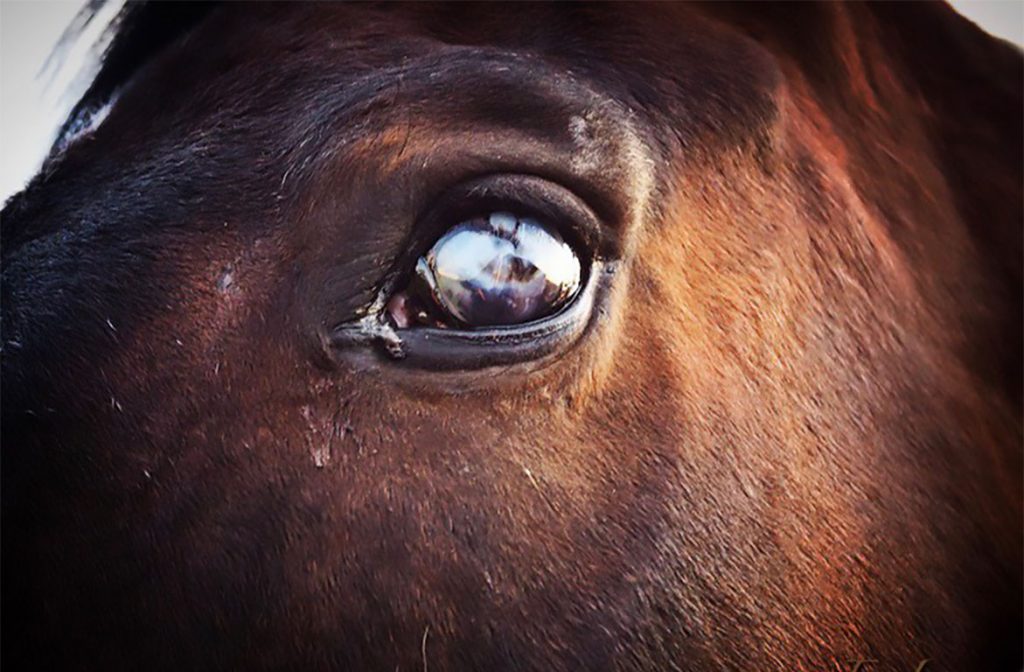
The equine programs are designed with the intention of :
At the very heart of the « Cheval Messager » experiential learning approach lies :
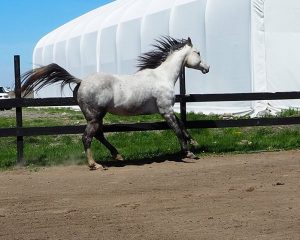
The free and unrestrained spirit of the horse, allowing a flow of energy in a space of learning
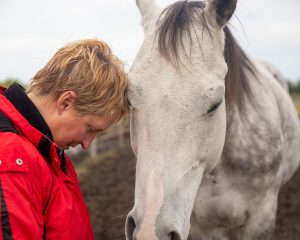
The increased ability of the participant involved in « experiential learning »
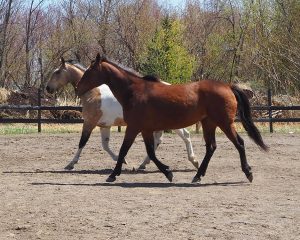
The vital bond between the above two pillars, mutually reinforced through facilitation techniques employed by the facilitator
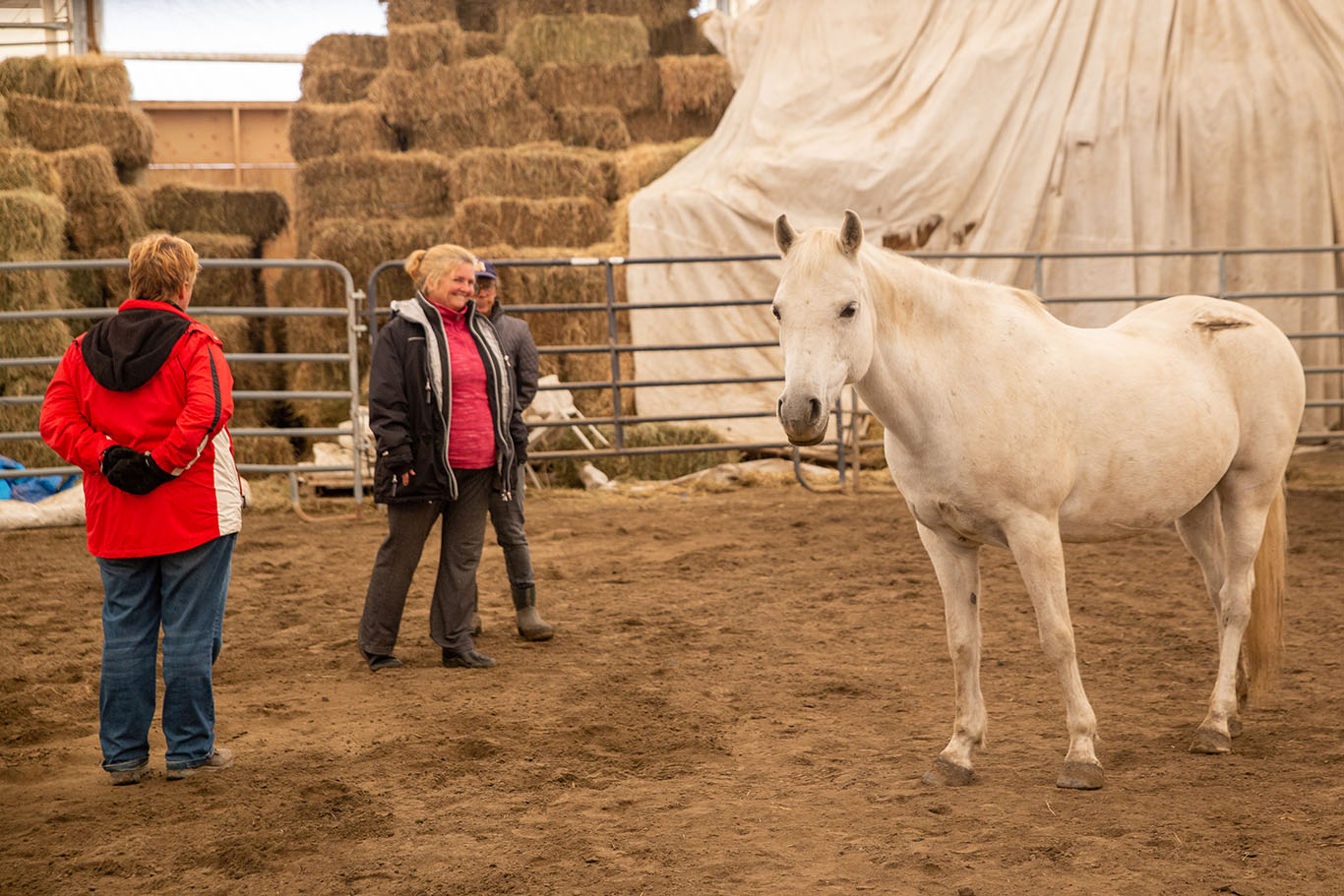
The underlying principle behind this approach is the ability to practice mindfulness in a protected environment and to experience the present moment awareness in our body.
As we work alongside a horse, we develop a better understanding of mindfulness and we equally experiment and learn new skills to develop a new mode of being, cultivating mindful self-awareness into our daily environment.
Horses dramatically improve our perceptive skills, our choices and their occurrences in our physical world, which can be described as a quantum leap into our new reality. Being a true reflection of our inner self, the horse guides us to the right path by accurately mirroring our state of mind, and enabling us to intuitively connect with ourselves, through our emotions and the information the latter give us about our real-time experience.
Working through our emotions without judgment or alteration, and valuing them as sources of information, enable us to change our perceptions, beliefs and attitudes once and for all. This state of « wakeful presence » and letting go is accompanied by an emotional, mental and physical « shift ».
The horse will only attune to our energy at a deeper and profound level i.e. when we are mindfully present by its side and consistent with our authentic self. In situations where we happen to dissociate ourselves from our inner thoughts, the horse will disengage and will interact again once we regain connection with our heart and mind. It is always our inner state the horse will respond to i.e. our authentic self.
The answers lie within ourselves and have never been beyond our reach. We have simply stopped paying attention to them. We have stopped aligning with our Higher Self for answers. We lost access to our primary insight i.e our intuition, as we gradually evolved into adulthood, paying more attention to the physical world, the mind and the conscious thoughts. Constantly torn between the past and the future, between guilt, shame or anger related to past memories and the future-related desire or fear, we have forgotten how simple it is to reconnect to our Higher Self, in the only space that really matters i.e. the present moment. Being a true reflection of our inner state, the horse enables us to reconnect intuitively to our Higher Consciousness, to our emotions, and to the insightful information the latter may disclose.
Equine-assisted experiential learning is an approach developed by Linda Kohanov in the 1990s and taught at the dawn of the 21st century. Very much a pioneer in this field, Linda Kohanov is the author of numerous reference books. She has also trained a generation of facilitators and instructors in the USA and on international level. This innovative method has been practiced on a daily basis by many participants for more than two decades. Its benefits have been widely observed in many fields :
The role of the facilitator/coach, consists above all, of knowing how to invite the horse to share a space of freedom with its human partner, with the aim of making the latter feel safe enough to step out of his « comfort zone » and explore his inner consciousness.
In this space of « unlimited possibilities and potential » (Kathleen Ingram ) », the horse is a respected partner, considered as a sentient and an intelligent being in its own right as well as a co-facilitator in experiential training.
A successful experience in equine-facilitated training cannot be « directive » like any classical coaching, for it relies on the development of specific qualities taught during the training program.
To be a Facilitator is to « embody the equine spirit » in thought, action and approach, to be caring, consistent, authentic, and intuitive, and to function without « pre-programmed expectations ». To be a facilitator, is synonymous to developing a Yin approach in a predominantly Yang world. To cut a long story short, it’s all about turning awareness into action.
Equine-facilitated practitioner training opens the door to a new direct personal experience, insight and self-transformation, and plays a pioneering role in the field of personal development and self discovery. Horses reflect and respond honestly to man’s behavior and therefore act as a mirror allowing humans to gain personal insight. As facilitators, the ability to create our own « shift » and to fully experience it in our lives promotes a greater self-awareness in our customers.
The mentioned certification program is basically about walking on the experiential path, guided by horses, with the eventual aim of accompanying future clients on their journey to personal development in symbiosis with their equine partners.
It also means receiving the necessary training tools and learning how to use them on a daily basis alongside the horse, as well as through practice via workshops and facilitation sessions.
Online theoretical modules
In view of the current sanitary situation and with access to the latest information technology, we are complying with the necessary precautions to ensure public health and safety. The online theoretical modules allow you to limit your exposure in a pandemic situation, and above all to free up the time spent on learning about horse-facilitated coaching experiences during an instructor-led training class.
The Cheval Messager certification program emphasizes the need for full instructor-led training courses in horse facilitation techniques, in the form of ground-based sessions or thematic workshops. The ground-based horse-assisted coaching is provided by Danielle Leduc and the theoretical courses are instructed online on an interactive platform with video footage and written material in PDF format.
Some specific parts of the theoretical training are taught by Isabelle Bérubé, a qualified psychologist and a certified facilitator/coach in equine experiential learning (F.E.E.L.). Modules related to clinical psychology are taught online by Isabelle Bérubé, clinical psychologist.


PLEASE NOTE THAT ALL WORKSHOPS WITH THE HORSES ARE PERFORMED ON THE GROUD WITHOUT ANY RIDING. NO EXPERIENCE IS REQUIRED. SMALL GROUPS OF 6 PEOPLE MAXIMUM PER WORKSHOP.
By submitting this form, you agree that Cheval Messager may use the contact information you provide to contact you regarding our products and services. You may unsubscribe from our communications at any time. To learn more about how to unsubscribe, our privacy practices and our commitment to privacy, please read our privacy policy.
Idéalement une expérience préalable de l’univers équestre est favorable. Néanmoins, notre formation s’adresse aussi à tous ceux qui n’auraient pas d’expérience avec les chevaux car notre programme intègre des enseignements relatifs à l’acquisition d’habiletés au sol.
Depending on the complexity of the thematic approach in question, the facilitator/coach may choose to work both independently and as part of a specialized team. In the latter case, a specialist multidisciplinary team (comprising of psychologists, doctors, educators, etc.) is set up to supervise and help you through, with the horse leading the way. The target clientele may vary in relation to your initial occupation.
On the basis of the above-mentioned elements, your potential customer is likely to be :
Ideally speaking, the course participants :
Ideally speaking, a prior experience in equestrian field would be an advantage but not an absolute requirement, as our course program incorporates lessons related to ground-based skills and horsemanship.
This course is suitable for :
The training program includes online theoretical and interactive courses as well as an instructor-led training course consisting of 6 modules taught at the Écuries Cheval Messager stables, located in Saint-Isidore de Laprairie in Quebec.
The concepts of horse-facilitated experiential learning are put into practice during multiple ground-based activities with horses.
The opportunity to put this teaching into practice at different intervals over a period of one year ensures greater assimilation of learning. Access to a horse is necessary for regular ground-based practice between sessions. The « Ecuries Cheval Messager » Stables are available for that purpose if need be.
In the course of time, the training takes on an aspect of a spiritual journey and inner quest, offering the future facilitator new avenues for personal growth both at physical and emotional levels. Changes in perception and a state of heightened awareness eventually facilitate the mainstreaming of best practices related to equine-assisted experiential learning, in accordance with the Cheval Messager Code of Ethics.
The sixth and final module is purposely designed and taught at the final stage of the training program, in order to allow future facilitators sufficient time to forge ahead on their path of self-development and to enrich their growing sense of awareness. The final module integrates complementary approaches and activities, based on ancestral concepts and knowledge.
In between the modules, the future facilitators are required to repeatedly practice ground-based activities with the horse, to read the material and watch documentaries or films selected from a range of works, and to draft brief customized reports on different aspects of their projects, insight, and biography.
In addition, video-conferences (private and collective sessions) with trainers and other participants, are incorporated, with a view to facilitating dialogue and providing support to the equine facilitated learning community.
MENTORING :
During Modules 4 and 5, participants are given the opportunity to observe and/or co-facilitate equine « workshops » in real conditions, under Danielle Leduc’s mentorship.
In addition, Danielle provides individual online mentoring over a one-year period.
This practical and extended mentoring program gradually enables the future facilitator to gain self-confidence in his facilitation capacities and skills, upon course completion.
Equine-assisted coaching is all about knowing how to decipher horse behavior and about possessing skills and abilities to interpret the language, messages, teachings, and indicators that may be carefully communicated to us by our equine partners, on our path to self-awareness.
It is also about creating and maintaining a space of safety that reflects compassion, tolerance, and a non-judgmental attitude for the participant.
Respect for these principles is of paramount importance to enable the latter to reflect on his emotions as an essential source of information, with the aim of raising self-awareness which in itself is a prerequisite to any inner or outer process of transformation.
Stepping out of our comfort zone, acknowledging all beliefs and attitudes underlying our blockages, stress, and past sufferings, shouldering our share of responsibility in the reality that we co-create on a daily basis, in order to eventually regain our inner strength, are the essential steps in any personal development process enabling the outward manifestation of an inward reality.
With the horse leading the way, the equine practitioner « guides » participants to reconnect to their true essence. Such an approach can be demanding and even intimidating.
The goal is therefore to enhance self-awareness in ourselves and others, to understand horse behavior and equine environment, and to equally develop sufficient mental flexibility and emotional agility to deal with any situation arising from human-horse interaction.
This know-how is partly based on the acquisition of solid theoretical knowledge in the field of equine and human behaviorism as well as on their basic anatomical, biological and physiological study. Moreover, it increasingly relies on the use of various “mindfulness-based” techniques either ancestral or modern ones, that rely on « mind-body » and « heart-mind » connections. Non-verbal, extra-sensory, and animal communication tools are also used in coaching.
The basics of neurosciences underlying various human consciousness levels are explored in detail.
Known to be man’s undeniable adventure companion over the millennia, the horse has developed a deep intuitive knowledge of its human partner. Discharged of all its military, farm, and urban-related « duties » of the past, the horse has henceforth become an ideal reflection of ourselves and a perfect thinking tool for personal development. Armed with unconditional love, specific to its animal species, the horse has proved to be a constant companion to man and forever « ready and willing » to accomplish its mission to serve humanity, as long as it is guaranteed the freedom to do so.
Savoir faciliter, c’est savoir comment décoder notre partenaire équin, son langage, ses messages, son enseignement et les indices qu’il laisse patiemment sur notre chemin d’éveil de conscience.
Faciliter, c’est aussi savoir maintenir un espace de sécurité, de bienveillance, de tolérance et de non-jugement pour l’être humain qui participe à cette expérience. Ceci est primordial pour que la personne s’autorise à « ressentir » les émotions qui sont des sources d’informations essentielles à toute prise de conscience préalable à tout changement significatif et à toute transformation intérieure et extérieure.
Car, sortir de sa zone de confort, prendre conscience des croyances et attitudes à l’origine de nos blocages, stress et mal-être, assumer notre participation et part de responsabilité dans la réalité que nous co-créons au quotidien, et ainsi récupérer notre propre pouvoir personnel dans notre vie : voici les étapes incontournables de tout processus de développement personnel menant à la manifestation extérieure d’un changement intérieur. Cette voie peut être exigeante, voire intimidante: le facilitateur est là, guidé par le cheval pour « faciliter » l’humain sur celle-ci.
Il s’agit donc de développer des capacités d’observation de soi-même, de l’autre, du cheval et de son environnement, ainsi qu’une flexibilité mentale et une agilité émotionnelle suffisantes à aborder toute situation issue de l’interaction homme-cheval.
Ce savoir-faire repose en partie sur l’acquisition de connaissances théoriques solides dans le domaine du comportement équin et humain et de leur bases anatomiques, biologiques, et physiologiques. De plus, il repose sur l’utilisation de différentes techniques dites de « pleine-conscience », ancestrales ou très modernes qui sont basées sur les liens « corps-esprit » et « cœur-esprit ». Des outils de communication, non-verbale, extra-sensorielle et animale, sont enseignés.
Les bases neuropsychiatriques et scientifiques des différents niveaux de conscience humaine sont explorées en détail.
Le programme de formation comprend des enseignements théoriques et interactifs en ligne ainsi que 6 modules présentiels de 4 jours aux Écuries Cheval Messager, à Saint Isidore de Laprairie, Québec.
Les concepts de l’apprentissage par l’expérience facilité par les chevaux sont mis en pratique au cours de multiples activités au sol avec les Chevaux Messagers.
L’opportunité de mettre en pratique cet enseignement à différents intervalles sur une période d’un an, permet une meilleure assimilation de celui-ci. L’accès à un cheval est nécessaire pour pratiquer régulièrement au sol entre les sessions. Les Écuries “Cheval Messager” sont disponibles à cette fin au besoin.
Parallèlement, avec le temps, cet apprentissage prend un aspect de chemin et de quête intérieure.
Le futur facilitateur évolue sur le plan physique et émotionnel. L’évolution de ses perceptions et de son état de conscience facilitent l’intégration des bonnes pratiques relatives à l’apprentissage par l’expérience facilité par les chevaux et le respect de la charte d’éthique Cheval Messager.
Le 6 ème et dernier module requis, est présenté à dessein à la fin du programme de formation afin de laisser aux futurs facilitateurs le temps suffisant d’avancer sur leur chemin de développement personnel et d’opérer leur propre “shift” de conscience . Ce module intègre des approches et activités complémentaires, basées sur des concepts et savoirs ancestraux.
Entre les modules, les futurs facilitateurs auront à s’exercer de façon répétée dans des activités au sol avec le cheval , à lire et visionner des ouvrages et documentaires ou films parmi un choix d’œuvres présélectionnées , et à produire de courts rapports personnalisés relatifs à différents aspects de leurs projets /vision/ biographie .
De plus des vidéo-conférences (sessions personnelles et collectives) avec les formateurs et avec les autres participants sont intégrées dans un objectif d’échange et de support au sein de la communauté “Cheval Messager”.
En fonction du degré de complexité de la thématique abordée, le facilitateur /coach peut choisir de pratiquer en « solo » ou au sein d’une équipe pluridisciplinaire spécialisée.
Des spécialistes (psychologues, médecins, éducateurs…) vous accompagnent dans ce cas, au pied du cheval.
Selon votre profession initiale, la population ciblée est différente.
En fonctions de ces éléments précités, vos clients seront, par exemple:
Nous ne pouvons éliminer le stress de notre vie et de notre environnement, mais nous pouvons apprendre à changer nos réactions émotionnelles, psychologiques et physiques à celui-ci. En un mot, nous pouvons apprendre à gérer le stress efficacement, à développer nos facultés de résilience et à évoluer vers un état de mieux-être.